
Sailing Today
|
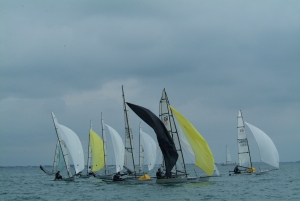 |
|
The RS700 associations e-Newsletter |
January
2006 |
    |
|
|
|
RS700
Breaking News...
-
Good
luck to all of those RS700 sailors taking part
in the Bloody Mary this Saturday.
-
Don't forget the re
scheduled RS Pursuit Race at Datchet Water on Saturday 21st
January.
-
Ian Nolan
came 2nd overall at
the 25th Grafham Grand Prix in the Catamarans and Fast
Asymmetric Fleet on the 1st January overcoming the
traditional hangover!
-
The training programme will shortly be up with
information on the nationals and Europeans in the next
couple of weeks.
|
|
|
|
Happy New Year...
I
begin by wishing you all a happy new year from the RS700
committee and all at LDC Racing Sailboats. If you missed
the first edition don't worry, you can still read it by
clicking here
to see what you missed.
In this
issue we have:
The London Boat
Show
RS700's in Germany
Club Corner - this month
we take a look at Hayling Island Sailing Club
Our survey say's
Supercharging your Spinnaker Systems
as from the recent RS News
RS700 AGM Minutes
Enjoy the read.
Duncan Ellis
GBR907
[email protected] |
|
|
The London Boat
Show
The London 2006 boat show is now upon us from the
6th-15th January stand number N1728. The majority of the
range will be there including the new RS500 and even an
RS800 suspended from the roof! If you are looking for a
new RS700 there will be a Boat show deal going on,
looking forward to seeing you all at the show! Don't
forget the RS boat show party is on the Saturday 7th of
Jan.
Alex Newton-Southon
RS700 Class Rep.
GBR 927
Direct line. 023 80 246 334
[email protected] |
 |
|
|
|
RS700s in Germany
In Germany we currently have 7 700s.
After a very quiet period there are currently more and
more people who seem to be really interested in the 700.
Also the sailors who are attracted currently are more
race orientated whereas the former owners tended to be
leisure sailors.
In Hamburg, northern Germany, we will
have 4 or 5 700s in the club from next season on. This
core will hopefully attract other people to join the
class. Iam sure some of the new owners will make it
either to lake Garda or to the British Nationals in
2006.
|
 |
|
In 2005 we had some Skiff-Open races –
together with Int. 14s, 29ers, MPSs, Int. Canoes etc.
This helps to get races together at all. Even with only
a little amount of boats per class. With the 29er as an
official youth class and more and more asymetrics
around, people in Germany will hopefully start to think
about modern developments including Fevas, Visions,
Vareos, 700s and 800s.
The MPS has been quite active in Germany recently and
will have their Euro Cup at Travemünde Week for the
second time next year. Apart from good racing and
brillant nightlife this event is a very good advertising
for a start-up-class.
We would like to invite the 700s (and
also 800s) to one of the big events like Travemünde
Week, Warnemünde Week or even Kiel Week (if we manage to
get in). In order to do so we would need to be sure that
a certain number of British sailors would be interested
to come over. Why not do it like other guys from the UK.
They share a container or huge trailer and fly in for
not a lot of money with Ryanair or another budget
airline. I can guarantee that all of you will have great
fun – on the water as well as with the Apres-sailing.
Christian Brandt
|
 |
|
|
|
Club Corner
Hayling
Island Sailing Club
Hayling is
situated on a sand spit on the south-eastern corner of
Hayling Island and has been in existence for over 70
years. In 2003 the new club house was completed at a
cost of over £4m which, whilst it attracted lottery
funding, relied on its members to donate a substantial
amount towards its cost.
Most of you
know all of this, so I thought it might be more
interesting to know what made me join Hayling and never
regret my decision.
In 1997 I
was sailing at Datchet Sailing Club up near Heathrow. I
remember Nick Peters kept on going on about Hayling and
trying to persuade all of us to join. I was sailing a
600 at the time and there was a fair fleet at Hayling so
I made the move.
|
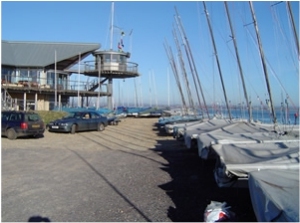
|
|
The Sailing
– moving from an Inland club to the sea teaches you
about tide and Hayling has it in buckets. Situated at
Chichester harbour entrance, you can get up to 4 knot
tides at Springs. This is particularly relevant to the
racing as it adds a complexity which can take several
seasons to master. The harbour sailing area is the most
challenging with the added fun of the sandbanks. Us 700s
are very used to the Hayling dagger board syndrome –
where it looks as if a shark has bitten chunks out of
the back of the board! Having the alternative of Hayling
Bay as a sailing area is a joy; the Chichester bar stops
the Solent traffic from tramping over the course so you
get a large area of free water even at peak season. |
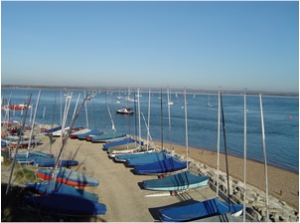 |
|
The Racing –
There is racing on both Saturday and Sunday from March
to December contributing towards the Spring, Summer and
Winter series. The race management is generally of an
excellent standard. In addition to this we have several
events including Fed Week (350 boats fill the harbour),
Family Fun week, the Tide Ride etc., In 2006 there will
be a weekend every month devoted to what is called the
Pennant Series. These are a series of one-off club
weekends for the supported classes with class prizes for
each weekend.
The Fleet –
there are now 35 registered 700s at Hayling. Of these we
see between 10 to 20 out on a Sunday even in the Winter
series. The standard ranges across the board from
beginner to Nationals standard (there are probably half
a dozen boats who would expect to be in the top 10 at
the Nationals racing regularly). All of this makes the
racing extremely exciting and one of the big attractions
of the club for me.
The Beaches
– for those of us with families, the beaches are a major
attraction. They are the only sandy beaches on Hayling
Island and the grockles cannot be bothered to walk to
them. In summer, most weekends are like being on
holiday. For the kids there are the junior fleets in
Oppies and Fevas and an excellent training programme for
them.
In summary,
it is a beautiful location offering some of the best and
most varied sailing in the UK, with a clubhouse and
facilities second to none.
Graham
Simmonds |
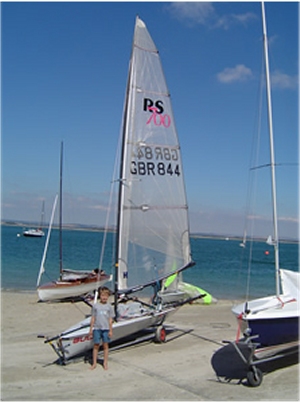 |
|
|
|
Our
survey say's?
What did we sail before the 700?
Well it
appears that 50% of 700 sailors came from another
singlehander, of which half were RS600’s. However,
considering the whole picture, 55% of owners came from
outside the RS stable so it’s not all bad news for LDC.
|
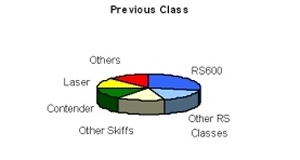 |
How long
have we been sailing?
A long time
is the unsurprising answer with the vast majority of us
having put in about 20 years on the water. The lowest
experience level was 8 yrs and the greatest 56. Hat’s
off to Peter Halliwell for this Corinthian achievement!
There is a
really even spread of experience in sailing the 700 but
about 2/3rds of people are in their first or second
seasons in the class.
Where do
we sail?
-
Hayling remains at the top of the table but
Queen Mary is growing rapidly with 20 boats.
-
Then
there are a number of smaller fleets with 4-5
active boats such as Chew Valley,Eastbourne, and
Hunstanton.
-
However, 40% of 700’s are sailed at clubs with
only 1 or 2 boats.
-
And
60% of 700’s are sailed on the Sea
|
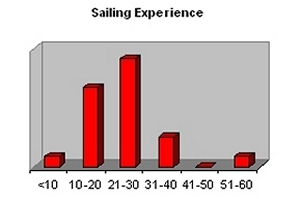 |
|
|
Supercharging your Spinnaker Systems
The Pump
system on the 700 is one of the boats defining
features, allowing you to hoist and drop the
spinnaker whilst maintaining control of your boat.
While this fits in perfectly with the class concept
of an ‘achievable challenge’, there are some areas
which benefit from a bit of care or some simple
class-legal upgrades to smooth things along. Here
is our simple guide to achieving the ‘perfect pump’.
|
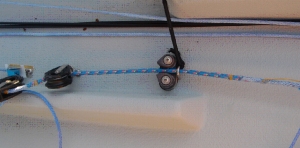
|
Avoiding the ‘F’ word
While
the standard system works as delivered, there is a
downside, the dreaded ‘F’ word, friction. The
additional pulleys and tensioning system introduce
some friction which, if left unchecked, can slow the
hoist and drop process, increase wear and tear on
the kite and just makes things hard work.
The
obvious first thing to do in order to improve the
situation is to ensure everything is well covered
with spray lubricant such as Holt’s Pro Lube or MacLube. Make sure you cover the following areas:
-
All
blocks – including the one up the mast
-
Spinnaker chute mouth
-
Bowsprit
This
alone will make a significant difference at very
little cost. However if you are willing to invest
some money, you can look at replacing some of the
standard equipment with lower friction alternatives:
-
Adopt larger diameter, lower friction blocks
from your favourite supplier
-
Replace the entire halyard with a small diameter
spectra/dyneema cord of about 2.5 to 3mm
diameter.
|
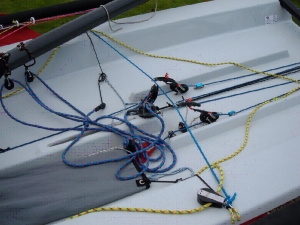 |
|
Hot-tip – if you go for a smaller diameter
halyard, make it thicker where the halyard cleats
off to avoid any slippage through the cleat. This
can be done by either whipping/stitching a piece of
outer cover onto the halyard for about 30cm around
the cleating point. This has the advantage that it
can be replaced as it wears! Alternatively, using a
splicing fid, you can pass another length of rope up
the central core to create a very professional
finish.
Pimp
your Pump Handles
The last
thing you want when you go to hoist or drop the
kite, is to find the pump handle wrapped around
itself leaving the halyard twisted and effectively
locked or the mainsheet tied in a neat double
bowline around the handle. Unfortunately this can
happen with the standard system where the handles
simply lay on the floor when not in use. This is
the one area where almost everyone has made a change
to their boat in one way or another. Two of the
most common systems are shown here.
In the
first, holes are drilled through one end of each of
the pump handles and small shackles are attached. A
piece of elastic is then attached to one kite block,
passed through the two handles and then tied off
under light tension on the other kite block.
|
This can
leave the area around the mainsheet cleat somewhat busy
so an alternative solution is to replace the pump
handles with tubes of alloy or carbon. Drill a hole in
each of the gunwales, pass the elastic from one gunwale,
through the handles and tie it off on the other side.
Job done!
Hot-tip – if you adopt the tubular handle,
make sure the edges are smooth by either rubbing down
the carbon tube or lightly using a hammer to roll over
the edges of the alloy. |
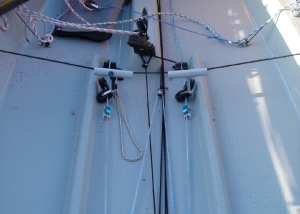 |
Turbo
your take-up
I think it
is fair to say that the standard system is operating at
the limit of it’s capabilities. There needs to be
enough tension in the system when hoisting and dropping
to ensure that the slack is taken up quickly after each
pump. But at the same time the systems needs sufficient
throw such that when the tension is released, the block
travels far enough to deliver adequate slack in the
downhaul. The answer to these problems is simply to
increase the number of purchases from the 2.5:1 which is
delivered.
|
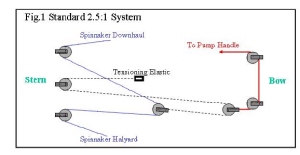 |
|
You can make
a very simple upgrade to a 3:1 system, by tying the
elastic through the forward block using a bowline. You
may need to replace the elastic with a slightly longer
piece to ensure there is enough slack when the tension
is released.
|
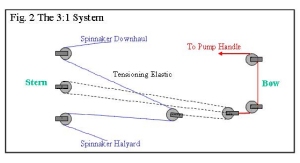 |
|
You may find
this sufficient to get things working well. However a
more significant improvement can be achieved by
adopting a 4.5:1 system.
For this you
need to replace the forward floating block with a
double, and fix an additional small block in line with
the existing block at the stern.
|
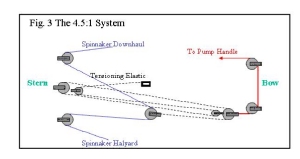 |
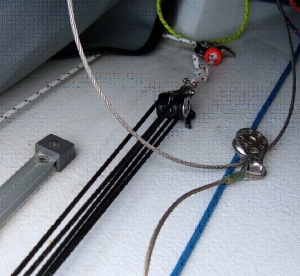 |
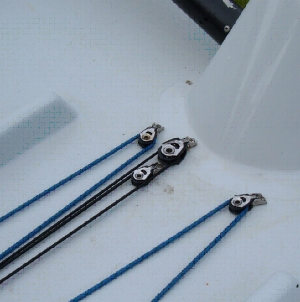 |
UnKlump
your Kite
The standard
system is such that the two downhaul patches pass down
the chute at the same time. This can create congestion,
particularly if things haven’t gone smoothly and the
kite has gathered round this clump.
By the simple addition of a small plastic ball and a
knot, the patches can be staggered by about 10 cm, which
eases the kite into and out of the sock. Simply pass
the downhaul through the lower ring, through a small
stopper ball and then tie a knot about 15cm from the
end. Finally tie off the downhaul with a bowline on the
upper patch. |
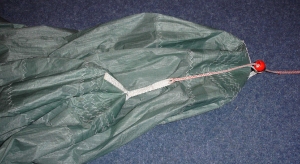 |
The
Small Print
While the
700 remains a strict one design, the association has
specified in the rules, a number of areas where changes
can be made. These are specified in detail within the
class rules which can be found on the association
website under the rules/docs section.
http://www.rs-association.com/index.asp?fleet=RS700&selection=forms
If you are
thinking of making a change to your boat but are not
clear whether it is legal or not, please feel free to
discuss your idea with the Class Committee before you do
anything drastic. You can always contact us either via
the yahoo group or directly on
[email protected].
You never know, even if it isn’t allowed
currently, if the concept is good enough and enough
members are willing to support it, there is a process
which we can follow to have your idea incorporated into
the rules.
Good Sailing
Ian Nolan
RS700 – The Achievable Challenge
|
|
|
|
RS700 AGM RUTLAND WATER 15/16th OCTOBER 2005
Minutes/Action points
Apologies.
Graham
Simmons, Andy White, Jerry Wales.
Introduced Committee
Members and their roles
-
Jon
Heissig- Event Coordinator
-
Andy
White- Training.
-
Jerry
Wales- Rules
-
Duncan
Ellis- Web site
-
Ian
Nolan- Communications
-
Graham
Simmons- membership (since Resigned)
-
Alex
Newton-Southon RS Rep/RS liaison
The meeting
discussed and made suggestions in a number of areas:
European Championship.
-
Aim to
improve Class Identity by Class evenings, Class
T-shirts and re-naming it European championships
rather than Euro Cup.
-
Possibility of lending boats to Top sailors for
example Paul Brotherton, Mark Rushall, Andy Rice.
Then doing write up for Y&Y etc. Raising profile.
-
Investigate separate courses to avoid clashes with
other fleets.
-
Investigate professional training before the event.
-
Investigate other French European event either for
later part of 2006 or 2007
-
New
European championship event for 2007 Travamunder
week, Wannemunde week. Quiberion, Carnac?
-
Arrange
French Nationals for us to support.
National Championships and
current thinking.
Problem of
Provisional Mounts Bay event in August.
-
Too
close to European championships
-
Too near
to bank holiday
-
Distance
from major fleets
Other
suggested venues.
-
Eastbourne
-
Highcliffe
-
Portland
-
Hayling
-
One
suggestion was to do a three-year cycle. e.g.
-
Hayling,
-
another south coast venue like Torquay
-
More
remote venue such as Mounts Bay / Abersoch
-
After a
long discussion a four day championships over a
weekend was favoured.
-
Suggested that the buddy system should be throughout
the year, to encourage people to turn up and
improve. Prizes for buddy’s who have achieved the
best at the championships or over circuit and keep
it continuously updated.
Provisional 2006 Circuit
-
8 events
throughout the year all for the circuit.
(including Winters, Nationals Inlands) with 5 – 8 to
count overall but must include two of the three
championship events.
-
A high
point scoring system to encourage greater attendance
(12 boats compete, 1st place 12 pts, 2nd
11pts. Etc)
-
Suggested that non-membership sailors could do one
event a year before coming a member of the
association as a taster.
-
Suggested one-day entree for weekend opens for
people just wanting to take part, mostly thinking of
home boats that cannot do the whole weekend
-
We
should publicise the contribution our sponsors make
in terms of prizes etc.
Training
-
Suggested that we do professional training at big
events such the nationals and Europeans.
|
|
|
|
email:[email protected] |
    |